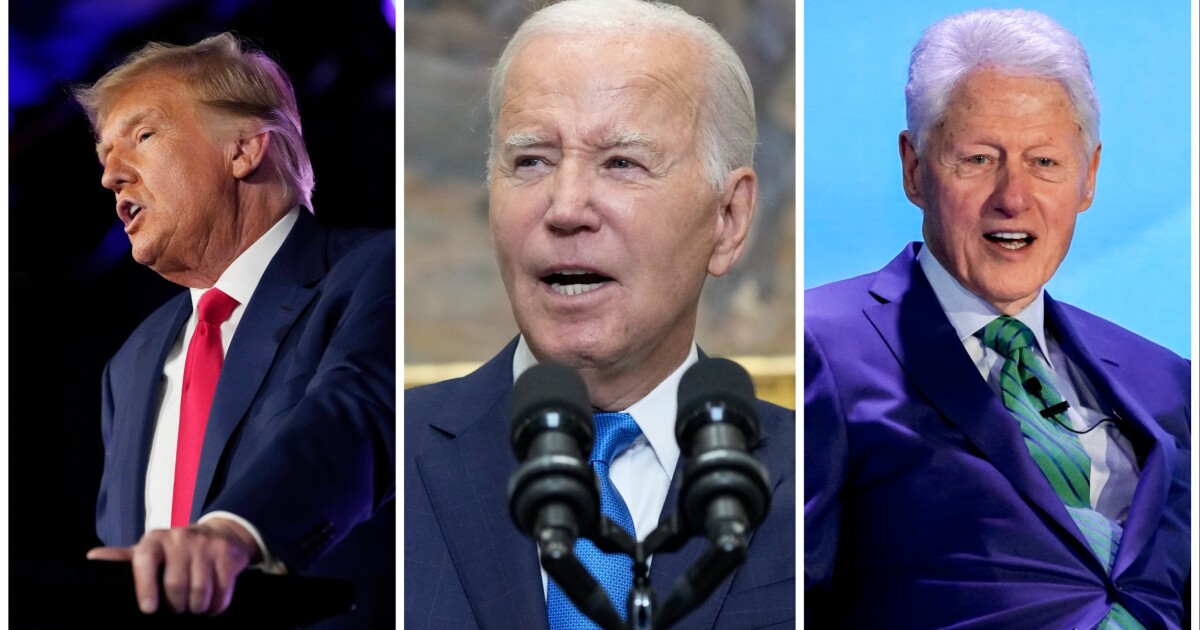

Presidents have faced impeachment efforts in the House for a variety of reasons over the course of U.S. history. On Tuesday, President Joe Biden joined that list when House Speaker Kevin McCarthy (R-CA) announced that the House would be opening an inquiry into the president.
The presidents who have had a run-in with an impeachment investigation include Thomas Jefferson, Harry S. Truman, and every president since 1981, excluding former President Barack Obama, according to an analysis from the Washington Post.
TRUMPISM 2.0: THE PERSONNEL NEEDED TO MAKE THE FORMER PRESIDENT’S POLICIES POSSIBLE
While a few of the actions to impeach were taken seriously, most of the efforts never led to official inquiries. Two of the presidents who faced impeachment efforts faced the prospect twice.
Here is a list of every president who faced an impeachment inquiry, whether articles of impeachment were filed or just considered.
Joe Biden
McCarthy announced this week that he would be directing House Judiciary, Oversight, and Ways and Means Committees to begin an impeachment inquiry. The inquiry will not be opened through a vote on the House floor.
Top House Republicans, including Judiciary Committee Chairman Jim Jordan (R-OH) and Oversight Committee Chairman James Comer (R-KY), have accused Biden of benefiting from his son Hunter Biden’s foreign business dealings or “weaponizing” the Department of Justice to obstruct efforts to investigate the dealings.
Jordan, Comer, and Ways and Means Committee Chairman Jason Smith (R-MO) will lead the inquiry efforts.
Donald Trump
There were two impeachment efforts against former President Donald Trump. In 2019, former House Speaker Nancy Pelosi (D-CA) and the House Intelligence Committee launched an impeachment inquiry into Trump.
Trump was accused of withholding aid to Ukraine while pressuring Ukrainian President Volodymyr Zelensky to investigate Biden when they were running on opposing tickets for president in 2020. Democrats believed Trump obstructed justice by refusing to hand over documents.
The former president was impeached in the House but acquitted by the Senate in 2020, both results mostly falling along party lines.
The second impeachment effort against Trump came in 2021. However, House lawmakers skipped an inquiry and filed articles of impeachment to the full House on Jan. 11, 2021. The former president was accused of “incitement to insurrection” following his efforts to overturn the results of the 2020 election, which led to the Capitol riot on Jan. 6.
The House impeached Trump a second time on Jan. 13, 2021. In February 2021, Trump was acquitted by the Senate after 57 senators, including seven Republicans, voted to convict him, falling short of a two-thirds majority.
Bill Clinton
The House Judiciary Committee filed an impeachment inquiry into former President Bill Clinton in 1998.
The inquiry came after a yearslong investigation led by special counsel Kenneth Starr into Clinton’s sexual relationship with a White House intern. Clinton was accused of lying under oath and obstructing justice to hide the relationship, which House Republicans believed qualified as “high crimes and misdemeanors.”
Four articles of impeachment were sent to the full House from the Judiciary Committee. The full House passed two of them, but Clinton was acquitted by the Senate in 1999. He was later fined by a federal judge for failing to testify about the affair truthfully.
Richard Nixon
Former President Richard Nixon faced an impeachment inquiry through the House Judiciary Committee for the Watergate scandal.
Nixon was accused of abusing his executive power and obstructing justice by hiding his connection to burglars who broke into the Democratic Party offices at the Watergate building in 1972. The Senate and a Justice Department special counsel conducted separate investigations, as well.
Three articles of impeachment were adopted but were not voted on by the full House when Nixon resigned on Aug. 8, 1974. The inquiry ended days later.
Andrew Johnson
Former President Andrew Johnson faced two impeachment inquiries, one in 1867 and one in 1868.
The Republican Party disliked Johnson, who served as former President Abraham Lincoln’s vice president, and categorized several of his actions as “high crimes and misdemeanors” to justify an inquiry.
After an 11-month investigation, lawmakers in and out of the House Judiciary Committee recommended his impeachment. However, the House failed to impeach Johnson during a December 1867 vote.
The second impeachment inquiry stemmed from an investigation out of the House Select Committee on Reconstruction. Johnson was accused of violating the Tenure of Office Act by attempting to fire Edwin Stanton, Lincoln’s secretary of war, who was a strong supporter of Reconstruction. This alienated Johnson from centrist Republicans, who soon established another inquiry.
Johnson was impeached by the House, and a Senate majority of 35-19 voted in favor of conviction. However, it came up one vote short of the two-thirds majority, so he was later acquitted and accused of using backroom deals and bribes to escape impeachment, per the Washington Post.
James Buchanan
Former President James Buchanan did not face an impeachment inquiry, but a House committee led by Pennsylvania Rep. John Covode held hearings in 1860 on allegations that Buchanan’s administration used extortion, bribery, and other efforts of corruption to secure slavery in Kansas.
Covode’s committee knew that they would not have the votes to impeach Buchanan, and he had already declined to run for reelection. However, the committee’s findings helped set the stage for Lincoln’s winning campaign for president later that year, according to Politico.
John Tyler
Former President John Tyler faced an impeachment inquiry led by Vice President John Quincy Adams in 1842.
Tyler vetoed several acts of Congress, leading his own party, the Whigs, to kick him out. They accused him of abuse of power and obstructing justice by refusing to produce documents requested by those investigating the inquiry.
However, lawmakers issued a report sustaining the charges but did not recommend to impeach, warning that the nation was already divided. A vote was held in 1843, but the House failed to impeach Tyler.
Thomas Jefferson
Former President Thomas Jefferson faced an impeachment inquiry resolution in 1809 that was not taken too seriously by lawmakers.
CLICK HERE TO READ MORE FROM THE WASHINGTON EXAMINER
Jefferson asked a federal official, who was old and sick and wanted to retire, to remain on the job until a replacement could be found. Massachusetts Rep. Josiah Quincy said it was a waste of public funds to pay an official who said he could not do his job, but the rest of the House did not agree.
Quincy’s impeachment resolution failed, 1-117.






